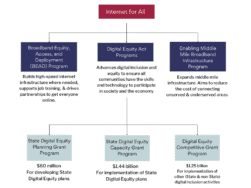Digital Equity Now: A Call to Action for Adult Education Leadership
June 2nd, 2022 | Blogs
Following the exciting news about the Affordable Connectivity Program from the Biden-Harris Administration, on May 13, the National Telecommunications and Information Administration (NTIA) released Notices of Funding Opportunity (NOFO) for three programs meant to advance digital equity and high-speed internet access for all Americans: Digital Equity Act (DEA), Broadband Equity, Access, and Deployment (BEAD), and Enabling Middle Mile Broadband Infrastructure. Collectively, these programs are part of the Internet for All initiative.
 Read now to learn more about the Digital Equity Act and what adult education leadership and advocates should know to take action now.
Read now to learn more about the Digital Equity Act and what adult education leadership and advocates should know to take action now.
What is the Digital Equity Act?
The Three Programs
 (Timeline from NTIA’s Digital Equity Act Programs Overview fact sheet.)
(Timeline from NTIA’s Digital Equity Act Programs Overview fact sheet.)
What is in a Digital Equity Plan?
A state’s plan must include the following:
What Now?
State adult education agencies and local adult education programs have an imperative to get involved with their state’s planning process:
Adult education leaders now need to focus their efforts on identifying who in their state is leading the application process for the State Planning Grant and the resulting planning process. (This could potentially be the State broadband office, but NTIA will release a full list of all administering entities once compiled.) Once at the table, leaders can advocate for their learners, as well as current digital inclusion models that have already proved successful.
Further Guidance
World Education will release further guidance and/or resources for adult education leaders as we learn more. For now, you can find further information on the DEA on the Internet for All site or read the full NOFO for the Planning Grant.
Other Digital Equity Resources from World Education
World Education fosters enduring partnerships across regions and sectors to advance education outcomes for all. We offer education systems strengthening, program design and implementation, applied research and evaluation, capacity development, and policy development services.